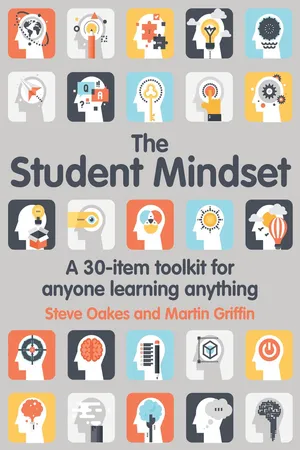
The Student Mindset
A 30-item toolkit for anyone learning anything
Steve Oakes,Martin Griffin
- 160 Seiten
- English
- ePUB (handyfreundlich)
- Über iOS und Android verfügbar
The Student Mindset
A 30-item toolkit for anyone learning anything
Steve Oakes,Martin Griffin
Über dieses Buch
In The Student Mindset: A 30-item toolkit for anyone learning anything, Steve Oakes and Martin Griffin provide clear, effective and engaging tools designed to help students plan, organise and execute successful learning.
Successful students find a way to succeed. They get the results they want. And they achieve this not by superior ability, but by sticking to habits, routines and strategies that deliver those results.
By cutting through the noise surrounding academic success and character development, bestselling authors Steve Oakes and Martin Griffin have identified the five key traits and behaviours that all students need in order to achieve their goals: vision, effort, systems, practice and attitude (VESPA).
These characteristics beat cognition hands down, and in The Student Mindset Steve and Martin provide a ready-made series of study strategies, approaches and tactics designed to nurture these qualities and transform your motivation, commitment and productivity.
The book's thirty activities, while categorised thematically under the VESPA umbrella, have been organised around six key phases of learning so that you can recognise which phase you're in before choosing from the range of tools and techniques to help you get through it. The six co-existing key phases are: preparation; starting study; collecting and shaping; adapting, testing and performing; flow and feedback; and dealing with the dip. At each phase you'll experience challenges and discover new ways of working, and this book's activities have been designed to help you gain control and become a better learner by sharing workload management tactics and revision strategies associated with calm, purposeful study and ultimately getting good results. These tools include a range of effective prioritisation, stress reduction, procrastination-busting and mindset development approaches all neatly packaged into this outstanding practical guide to becoming a successful and confident student.
Suitable for all students.
Shortlisted for the Non Obvious Book Award.
Häufig gestellte Fragen
Information
Preparation
Questions:
Key elements of the VESPA model in this phase:
1. Vision Activity: The Learner’s Manifesto
| 1 | Discard fear of failure; instead expect it. |
| 2 | Be comfortable with ‘I don’t know’. Your mind is ready for new thoughts, not rehashing old ones. Get comfortable with ‘that doesn’t make sense’. Turn it into ‘that doesn’t make sense yet’. See if you can hold opposing, illogical ideas in your head for long periods. It’s safe to assume that you’re going to study something that might not make sense for a week, a month or even longer. Disregard ‘common sense’ preconceptions or ‘what I thought was true’. Most people’s early education has dealt in strategically simplified versions of the truth. |
| 3 | Seek out divergent thinking. There are many possibilities and many answers, not just one. Others may have persuasive opinions; you don’t need to wholeheartedly agree with them. |
| 4 | Be curious and enquiring. Replace ‘I’m dreading this!’ with ‘I wonder what this will be like?’ Focus on questions rather than answers. |
| 5 | Psychologist Abraham Maslow said we should try to think ‘without fashions, fads, dogmas, habits or other pictures-in-the-head of what is proper, normal, “right”’. Instead, we should be ‘ready to receive whatever happens to be the case without surprise, shock, indignation or denial’ (Maslow, 2000, p. 194). |